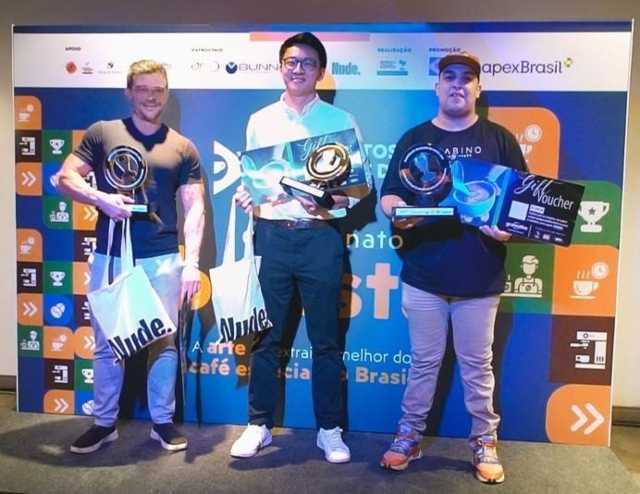SÃO PAULO, Brazil – After three disputed days of intense competition at the Brazilian Baristas Championship, Boram Um’s winning Brazilian specialty coffee presentation stole the limelight – landing him a place at the World of Coffee 2023 fair in Athens this June 22-24. Boram Um used coffee varieties such as Yellow Bourbon, from the UM Coffee e Co farm, owned by his own family, which is located in Serra da Mantiqueira, in the southern region of Minas Gerais, Brazil.
The drinks had sensory notes such as tangerine, plum, white flowers, orange floral, and a balanced acidity.
Boram Um will compete at the World of Coffee 2023 fair in Athens
“I am very happy, I have been working in these competitions for years now and we have three titles, I am very happy to be able to represent Brazil again. Now, we have to study hard for the world championship, the challenge is huge and the objective is to reach the final stage and potentially bring a beautiful trophy to our country,” said Boram Um, Barista.
Second place went to Leo Moço and third place to Hugo Silva. The championship, is part of the project “Brazil. The Coffee Nation”, held by the Brazil Specialty Coffee Association (BSCA) and the Brazilian Trade and Investment Promotion Agency (ApexBrasil), and is sanctioned by World Coffee Events (WCE).
“This championship is very important because it celebrates the coming together of Brazilian specialty coffee and the professional barista. Over the years, Brazil has been growing in terms of quality, allowing a better repertoire for the professional barista to offer more options to the final consumer as well as a cup of excellence,” said Vinicius Estrela, BSCA’s Executive Director.
The 18 contestants were judged on their skills in coffee preparation and presentation, as well as their knowledge of the industry and the products they are using. The quality of the specialty coffee and the presentation of the baristas impressed the judges.
“I had one of the best Brazilian coffees I have ever tasted this weekend at the championship. The quality of the coffee, of the presentations, of the performances and the baristas themselves were really, really high,” said Richard Corney, Head Judge and World Coffee Events Representative.
Luiz Salomão, who has been a judge for 15 years, shared the same opinion: “We saw the evolution of the coffee beans, and how baristas are increasingly involved in the entire chain process. The way the baristas created the synergy of coffee with ingredients used in their drinks caught our attention, it shows that they are studying flavors more and more, and what to look out for in order to create a drink with unique sensory notes.”
Brazil is the largest coffee producer and exporter in the world, there are 34 producing regions, with more than 150 varieties, with a sensory profile beyond the traditional sensorial notes often associated with Brazilian coffees such as chocolate, caramel and nuts. Dedication to quality and research into post-harvest processing methods such as anaerobic fermentation have yielded rare and exotic flavors and aromas such as passion fruit, blueberry, wild strawberry preserves, brilliant acidity and velvety body, among others that are considered unique.
In 2022, 122 countries bought Brazilian beans. Specialty coffee, for example, has consistently grown at an annual rate of 10% to 15% over the past few years, and represents around 20% of Brazilian coffee exports and for the 2021/22 harvest, some 8 million 60kg bags of specialty coffee were exported. The value of the global trade in green coffee beans is over USD 30 billion per year.
About Brazil. The Coffee Nation
Is a sector project, developed by BSCA and ApexBrasil, focused on the commercial promotion of the Brazilian product on the international market. The objective is to strengthen the image of Brazilian coffee beans worldwide and to position the country as a high-quality supplier, using state-of-the-art technology resulting from research.
The current project has as target markets: i) Canada, United States, China, South Korea, Japan, Germany, Spain, Poland, United Kingdom, Turkey, United Arab Emirates and Saudi Arabia for specialty coffee beans; and ii) Canada, China, United Arab Emirates, Chile, Portugal and the United States for products from the roasting and grinding industry.
The project also aims at exposing the exclusive certification and traceability processes adopted in the national production of specialty coffees, highlighting their social and environmental responsibility and incorporating a competitive advantage to Brazilian products.


















